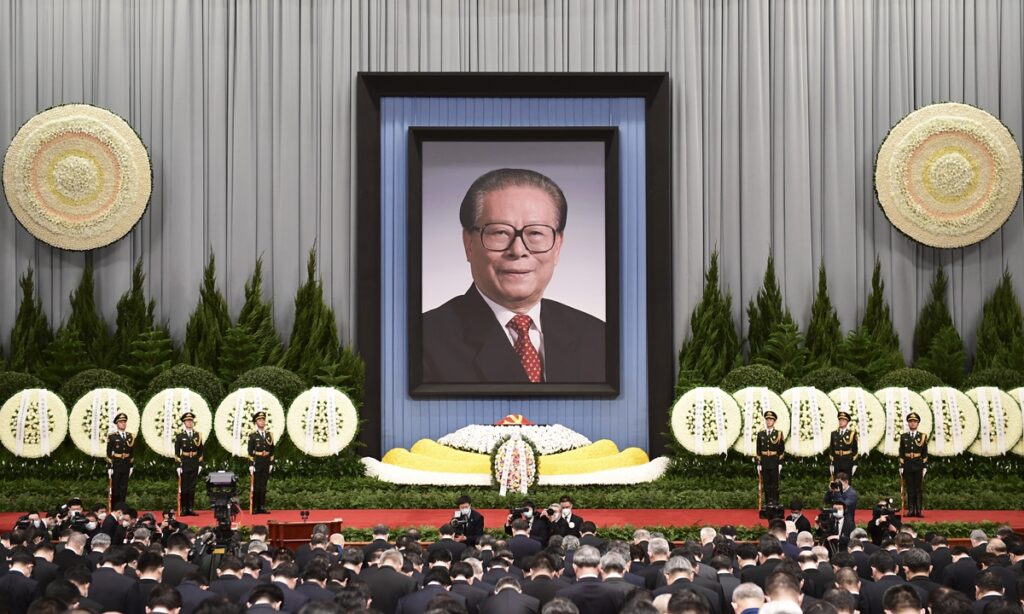A memorial meeting for Jiang Zemin, who passed away on November 30 at the age of 96, was held Tuesday morning at the Great Hall of the People in Beijing.
Xi Jinping, general secretary of the CPC Central Committee, Chinese president and chairman of the Central Military Commission, addressed the meeting. All participants in the Great Hall of the People paid a three-minute silent tribute to Jiang at the start of the memorial meeting on Tuesday.
Many people across the country who watched the meeting via TV or internet also paid tribute in their own ways, and many vehicles honked horns on the roads to pay tributes. The event, participated by senior officials of the Communist Party of China (CPC), was broadcast on national television and on the internet to the people all over the nation and the world.
During his speech at the memorial meeting on Tuesday, Xi reviewed Jiang’s great and glorious life with high compliments.
“We hold Comrade Jiang Zemin in high esteem, and cherish the memory of Comrade Jiang Zemin because he devoted his life to the Chinese people, and worked tirelessly throughout his life to contribute to the cause of national independence and the liberation of the people, and to the prosperity of our country and the well-being of our people,” Xi said.
The great achievements of our Party and the country in the 13 years following the fourth plenary session of the 13th CPC Central Committee are inseparable from Comrade Jiang Zemin’s great talent, bold vision, key role, and exceptional art of political leadership, Xi noted.
According to the Xinhua News Agency on Tuesday, people from all walks of life in the national capital lined the streets on Monday to see off their beloved Comrade Jiang, expressing their deep sorrow as the hearse journeyed from the Chinese PLA General Hospital to the Babaoshan Revolutionary Cemetery in Beijing.
Jiang was an outstanding leader enjoying high prestige acknowledged by the Communist Party of China, the entire military and the Chinese people of all ethnic groups.
He was hailed as a great Marxist and a great proletarian revolutionary, statesman, military strategist and diplomat. Jiang was a long-tested communist fighter and an outstanding leader of the great cause of socialism with Chinese characteristics. He was the core of the third generation of the Party’s central collective leadership and the principal founder of the Theory of Three Represents.
Since Jiang passed away on November 30, many foreign leaders, the UN Security Council and many media outlets around the globe have also paid deep respects and compliments for Jiang’s political career and contributions, not only to China but also the international community.
Chinese analysts said Jiang’s leadership, from 1989 to the early 2000s, laid a solid foundation and created conditions in the fields of politics, the economy, military, diplomacy and affairs related to Hong Kong, Macao and Taiwan, for his successors to achieve greater goals.
By mourning Jiang, a key leader who led the Party to safeguard China’s socialist path during a period marked by huge challenges in the late 1980s and who consolidated and improved China’s path of reform and opening-up from the 1990s to the 2000s, China is sending a message to the world that the country will unwaveringly insist on reform and opening-up to boost integration with the world, and will inherit the treasured legacies from the past to firmly safeguard its socialism and sovereignty, experts said.
Safeguard socialism and opening-up
Jiang became the top leader of China in the late 1980s, a time with huge challenges and complex situations externally and internally. It was an extremely difficult time for the CPC and China, as political turmoil within and outside the country deeply threatened the development of socialism and the confidence of communists, as well as ordinary people in some socialist countries. Jiang did not waver from the trust given to him by the Party and the Chinese people, as he safeguarded socialism with Chinese characteristics with a series of successful efforts, analysts noted.
Wang Yiwei, director of the Institute of International Affairs at the Renmin University of China, told the Global Times that one of Jiang’s most important legacies is that he insisted on consolidated and improved reform and opening-up for China, and in terms of foreign affairs, Jiang made many significant contributions to serve the economic development of the country.
“Jiang smartly and flexibly handled ties with the US, as the US and the whole Western world were crucial to the success of China’s opening-up. He therefore put a lot of effort into fixing ties and boosting mutual understanding between China and the US, as well as the whole Western world. In some cases, when dealing with cases such as the Taiwan Straits Crisis in 1995-1996 and the US bombing of the Chinese Embassy in Belgrade in 1999, he also tried his best to safeguard China’s bottom-line with a firm stance, but also pragmatically to avoid unnecessary conflict with the US when China needed to keep a low profile to realize development,” Wang said.
Li Haidong, a professor from the Institute of International Relations at the China Foreign Affairs University in Beijing, told the Global Times that Jiang concluded negotiations on demarcation of the border with most of China’s neighbors after the Cold War, and this formed a peaceful security environment for China to insist on reform and opening-up.
“And with Jiang’s leadership, China confidently promoted exchanges and communication with the outside world, and since the 1990s, China’s idea of multilateralism has influenced many countries and won support worldwide, which fed into things like the establishment of the Shanghai Cooperation Organization and China’s victory in gaining membership of the World Trade Organization. These were crucial for China to achieve so many historic goals afterward,” Li noted.
‘One country, Two systems’
Jiang also witnessed and finished the transition processes of the return of Hong Kong and Macao, and boosted friendly exchanges and cooperation between the people from the two sides of the Taiwan Straits by reaching the 1992 Consensus with the then KMT authority in Taiwan. He reinforced the one-China principle to become a world-recognized consensus among members of the United Nations and different international organizations, and warned off Taiwan secessionists with military force during the Taiwan Straits Crisis of 1995-1996, Li noted.
Many people in Hong Kong have fresh memories about Jiang’s visits to the city, witnessing the city’s return to the motherland and leaving some classic quotes about Hong Kong media. “Hong Kong’s future will be better,” is one of his most widely shared quotes.
“Jiang made great contributions to the country and to the Party. Meanwhile, he cared a lot about the city [of Hong Kong], helping the city’s smooth return to the motherland,” Tam Yiu-chung, a member of the National People’s Congress Standing Committee, told the Global Times on Wednesday.
Tam remembers that on one visit to Hong Kong, Jiang suddenly decided to visit a local community. He appeared at a shopping mall, surrounded by many residents who cheered with him, which was very expressive, he said.
“He offered a lot of trust and encouragement to Hong Kong, and many local residents are very familiar with him,” Tam said.
Keep marching forward
According to the Communiqué of the 6th plenary session of the 19th CPC Central Committee released in November 2021, “Chinese communists, with Comrade Jiang Zemin as their chief representative, united and led the whole Party and the entire nation in upholding the Party’s basic theory and line, deepening their understanding of what socialism is and how to build it, and what kind of Party to build and how to build it.”
On this basis, they formed the Theory of Three Represents. In the face of complex domestic and international situations and serious setbacks confronting world socialism, they safeguarded socialism with Chinese characteristics, defined building a socialist market economy as an objective of reform and set a basic framework in this regard, and established a basic economic system for the primary stage of socialism under which public ownership is the mainstay and diverse forms of ownership develop together, as well as an income distribution system under which distribution according to work is the mainstay while multiple forms of distribution exist alongside it, said the communiqué.
They opened up new horizons for reform and opening-up across all fronts and advanced the great new project of Party building. All these efforts helped to successfully launch socialism with Chinese characteristics into the 21st century, the communiqué said.
Experts said Xi’s speech at the memorial meeting on Tuesday highlighted many important contributions and key thoughts of Jiang that showed continuity and inherited relations between different generations of CPC leadership, such as Jiang’s thoughts about reform and opening-up, anti-corruption, national defense and fighting spirit, and we can see they have been reflected in many contents of the report to the 20th National Congress of the CPC.
Therefore, by commemorating Jiang, the CPC is also sending a message that what the Party and the country are doing today is just keeping in line with the previous route, and the successful experience for governance and revolutionary traditions will not be abandoned but only be inherited and improved, and China will achieve more goals in the new era, experts noted.
(Global Times)



